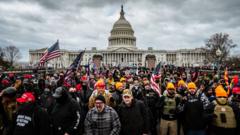As the January 19 deadline approaches, the future of TikTok in the US hangs in the balance after the Supreme Court's recent ruling against its owner, ByteDance. With a ban looming, many are left to wonder if users will still have access to the app and what alternatives might emerge on the social media landscape.
TikTok Ban Solidified by Supreme Court: Implications Ahead

TikTok Ban Solidified by Supreme Court: Implications Ahead
The US Supreme Court's ruling to uphold the TikTok ban has significant consequences for users and app creators alike.
TikTok faces an imminent ban in the US set for January 19, following the Supreme Court's dismissal of a legal challenge from its owner, ByteDance. The Court determined that the law—banning the popular social media platform—does not violate the First Amendment rights of TikTok and its 170 million American users. However, the decision raises questions about whether this ban will indeed prevent Americans from using the app.
While President-elect Donald Trump has previously hinted at desires for a ban, he now insists that TikTok’s future lies in his hands, implying he might be seeking a “political solution.” He recently revealed discussions with Chinese President Xi Jinping over trade and TikTok, aiming to negotiate some resolution before the ban takes effect. His security advisor, Mike Waltz, suggested that efforts are underway to preserve American access to TikTok, though no specifics have been outlined yet.
While the Biden administration has signaled it won't enforce the ban, Trump could still direct the Department of Justice to ignore the law, effectively allowing continued downloads on app stores. However, new downloads would be halted, and future updates to the app may cease, preventing necessary bug fixes and security improvements that protect user data.
Individuals keen on accessing TikTok after the ban could turn to VPNs or change their app store regions. Yet, the government's proposal also includes restricting internet hosting services from facilitating access, indicating a multifaceted approach to enforcement.
The potential for TikTok's functionality in the US is murky; experts warn that restrictions could lead to fragmentation of the internet and have lasting impacts on social media. Despite persistent speculation about potential buyers—ranging from Elon Musk to YouTuber MrBeast—ByteDance has ruled out selling the platform to this point.
With TikTok's considerable user base likely in flux, analysts predict that alternative platforms, notably Meta's Instagram Reels and YouTube Shorts, may see a surge in users displaced by the ban. Insights reveal that marketers could redirect their advertising budgets to those platforms, suggesting that TikTok's ban could have a significant ripple effect on the digital marketing landscape.
The uncertainty surrounding TikTok’s future and the effects of a potential ban are warming up a competitive landscape ripe for other platforms, although no app currently holds a complete substitute for TikTok’s unique features such as the TikTok Shop, which has proven lucrative for creators. As the situation unfolds, avid users and creators alike are left with a sense of trepidation regarding the impending changes.
While President-elect Donald Trump has previously hinted at desires for a ban, he now insists that TikTok’s future lies in his hands, implying he might be seeking a “political solution.” He recently revealed discussions with Chinese President Xi Jinping over trade and TikTok, aiming to negotiate some resolution before the ban takes effect. His security advisor, Mike Waltz, suggested that efforts are underway to preserve American access to TikTok, though no specifics have been outlined yet.
While the Biden administration has signaled it won't enforce the ban, Trump could still direct the Department of Justice to ignore the law, effectively allowing continued downloads on app stores. However, new downloads would be halted, and future updates to the app may cease, preventing necessary bug fixes and security improvements that protect user data.
Individuals keen on accessing TikTok after the ban could turn to VPNs or change their app store regions. Yet, the government's proposal also includes restricting internet hosting services from facilitating access, indicating a multifaceted approach to enforcement.
The potential for TikTok's functionality in the US is murky; experts warn that restrictions could lead to fragmentation of the internet and have lasting impacts on social media. Despite persistent speculation about potential buyers—ranging from Elon Musk to YouTuber MrBeast—ByteDance has ruled out selling the platform to this point.
With TikTok's considerable user base likely in flux, analysts predict that alternative platforms, notably Meta's Instagram Reels and YouTube Shorts, may see a surge in users displaced by the ban. Insights reveal that marketers could redirect their advertising budgets to those platforms, suggesting that TikTok's ban could have a significant ripple effect on the digital marketing landscape.
The uncertainty surrounding TikTok’s future and the effects of a potential ban are warming up a competitive landscape ripe for other platforms, although no app currently holds a complete substitute for TikTok’s unique features such as the TikTok Shop, which has proven lucrative for creators. As the situation unfolds, avid users and creators alike are left with a sense of trepidation regarding the impending changes.




















